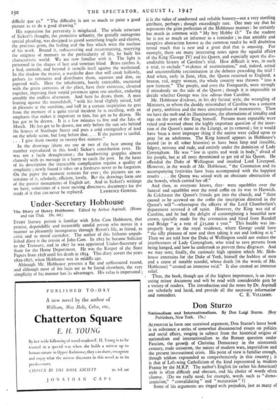Under-Secretary Hobhouse
The Diary of Henry Hobhouse. Edited by Arthur Aspinall. (Home and van Thal. 10s. 6d.)
EVERY literary person is familiar with John Cam Hobhouse, that precise, dependable and inexorably candid person who moves in a manner so pleasantly incongruous through Byron's life, as friend, as critic and as moral caretaker. The author of this hitherto unpub- lished diary is the cousin of John Cam. In 1812 he became Solicitor to the Treasury, and in 1817 he was appointed Under-Secretary of State for the Home Department. He was the Keeper of the State Papers from 1828 until his death in 1854. This diary covers the years 182o-1827, when Hobhouse was in middle age.
Although Mr. Hobhouse presents a flat and unflavoured record, and although most of his facts are to be found elsewhere, the very simplicity of his manner has its advantages. His value is impersonal ;
it is the value of unadorned and reliable honesty—not a very startling attribute, perhaps ; though exceedingly rare. One may say that he
represents the grim perfection of the Hobhouse manner: he certainly
has much in common with " My boy Hobby 0." To the student he is not so much an informer as a reminder ; to that amiable and receptive abstraction known as the common reader he will doubtless reveal much that is new and a great deal that is amusing. For example, there are many interesting notes upon the squalid affairs of the King (George IV) and his Queen, and especially upon the dis- creditable history of Caroline's trial. How difficult it was, in such a trial, to exclude " evidence of recrimination," and, indeed, actual and uncontrollable recrimination in the debates preceding the trial ! And when, early in June, 182o, the Queen returned to England, a brazen, red, angry woman, the whole country was thrown " into a new ferment." The people, and even the Footguards, were strongly if mistakenly on the side Of the Queen ; though it is impossible to decide whether George was less odious than Caroline.
Mr. Hobhouse discloses, in his dry factual style, the wrangling of Ministers, to whom the shoddy misconduct of Caroline was a concern of party, ambition and the most unscrupulous of manoeuvres. Then we have the mob and its illuminations, the alternations of timidity and rage on the part of the King himself. Persons more reputable were vexed and worried about the highly important question of the inser- tion of the Queen's name in the Liturgy, or its removal ; for it would have been a most improper thing if the nation were called upon to pray for an adulteress. The King himself appears in Hobhouse's record (as in all sober histories) to have been limp and irascible, fidgety, nervous and rude, and entirely under the dominion of Lady Conyngham. He was "low in spirits and weak in body," afraid of his people, but at all costs determined to get rid of his Queen. He offended the Duke of Wellington and insulted Lord Liverpool. However, in the words of Mr. Hobhouse, " the Coronation and its accompanying festivities have been accompanied with the happiest results . . . the Queen was seized with an obstinate obstruction of the bowels, which carried her off."
And then, as everyone knows, Cher- were squabbles over the funeral and squabbles over the royal coffin on its way to Harwich. At Colchester the Queen's friends got into the church, and " there caused to be screwed on the coffin the inscription directed in the Queen's will "—whereupon the officers of the Lord Chamberlain's department screwed it of again. However, the King was rid of Caroline, and he had the delight of contemplating a beautiful new crown, specially made for the coronation and hired from Rundell and Bridge " at a rent of £i5,000 a year." This bauble was im- properly kept in the royal residence, where George could have " the silly pleasure of now and then taking it out and looking at it." Then we are told how the Duke of Wellington could not endure the interferences of Lady Conyngham, who tried to save persons from being hanged, and how he undertook to prevent these disgraces. And we may note, finally, the curiously high opinion which Mr. Hob- house entertains for the Duke of York, himself the feeblest of men and a cause of notable scandal, whose death (in the words of Mr. Hobhouse) " created an immense void." It also created an immense relief.
Thus, the book, though not of the highest importance, is an inter- esting minor document and wili be read with considerable gain by a variety of readers. The introduction and the notes by Dr. Aspinall are scholarly and lucid, and provide all the necessary informatior


































 Previous page
Previous page